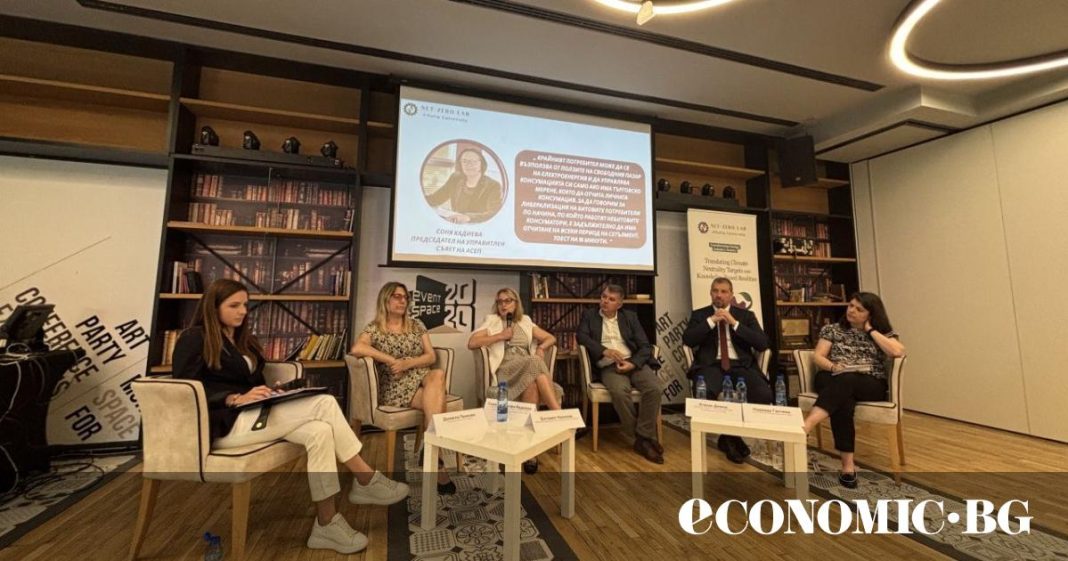We are not the first to embrace liberalization, just as we were not the first to adopt the euro. We will see that there is nothing to fear from either. This was stated by Dr. Bogomil Nikolov, Executive Director of the Bulgarian National Association of Active Consumers (BNAC), during a discussion organized by the research unit of the Faculty of Economics, Net-Zero Lab.
The discussion was dedicated to the repeal of the liberalization of the electricity market for households and the issues that were not discussed before the process was halted.
The change will affect consumers, there is no doubt about that
According to Dr. Nikolov, any change affects consumers because it changes their way of life and what they are used to.
We are used to receiving some numbers every month, paying them, and then we have no further interest,” he explained.
According to him, technology now allows for much greater participation by consumers or households in the market.
Nowadays, people can’t just receive bills and pay them. That would be foolish behavior. If we do not liberalize, we are preventing progress and limiting ourselves,“ Dr. Nikolov said categorically.
From his words, it became clear that liberalization of the energy market can bring benefits to consumers when they are prepared for it.
At the very least, this includes an active policy against energy poverty, protection of competition, and combating unfair practices by traders, as well as encouraging households to produce energy,“ explained the executive director of the BNAE.
Democratization of the energy sector
Instead of introducing targeted measures to tackle energy poverty, all consumers indirectly support uncompetitive coal-fired power plants,“ said Nadezhda Gancheva, senior analyst at the Center for the Study of Democracy.
According to her, postponing liberalization distorts the electricity market, limits incentives for investment, and increases the sector’s dependence on state subsidies.
She also believes that liberalisation is perceived in Bulgaria as a frightening topic and change, and that change in general is frightening and is used for political gain.
The expert claims that the delay in liberalisation is intended to support and continue subsidies for coal-fired power plants, which are neither competitive on their own in the market nor meet any requirements in terms of emissions.
The authorities, which were actually supposed to prepare the liberalization, are postponing it yet again,“ added Gancheva.
Metering every 15 minutes
According to Sonya Kadieva, chair of the Free Energy Market Association (ASEP), end users can only reap the benefits of a free electricity market and manage their consumption if there is commercial metering that records personal consumption.
In order to talk about liberalization of household consumers in the same way as non-household consumers, it is essential to have metering for each settlement period, i.e., every 15 minutes,” Kadieva explained.
According to the chair of ASEP, for consumers to actively participate in the market, they need to know how much they’re using at any given time.
There needs to be data on this so they can actively manage their electricity consumption, and that’s not happening right now,“ she emphasized.
Faith in the market?
Daniela Penkova, an expert at the Confederation of Labor (KT) Podkrepa, is strongly opposed to liberalization.
According to her, the only ones who will benefit from the free market are cheap producers, who will receive excessive profits for what they do.
There will be no improvement in terms of energy, which will remain the same as it is today. There will be huge market manipulation,“ Penkova was categorical.
On the other hand, Atanas Dimov, deputy chairman of the Association of Energy Traders in Bulgaria (ATE), said he believes in the market principle.
I believe that this is the only way to create fair conditions, prices, and price levels that apply to everyone,” Dimov explained.
According to him, the market is the most important regulator and it sends the right signals to all commercial players and all entities involved in it for further plans for future development.
There was a question about whether traders were ready for this. I would say that they are ready. End consumers should know that there is not much difference,” Dimov assured.
Author: Katerina Naydenova, intern reporter at Economic.bg
Translated with DeepL.
Източник: Economic.bg


